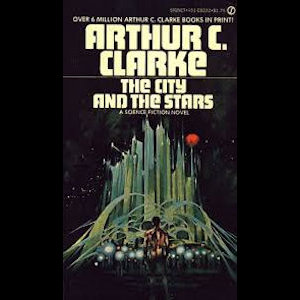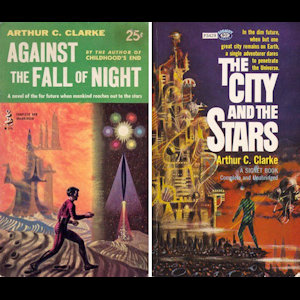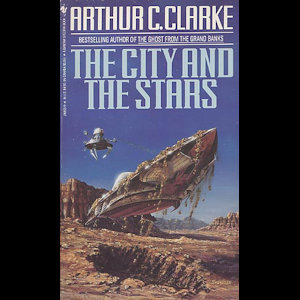The Summer of Arthur C. Clarke: The City and the Stars
Before I begin, welcome to my Summer of Arthur C. Clarke. On the heels of last year's popular Slasher Summer, this year I'm leaving behind the guilty pleasure of the niche horror genre and exploring something a little closer to my own heart: namely science-fiction. Of all the sci-fi greats, none have influenced me more than the late Arthur C. Clarke, my personal favorite of the "Big Three" from the Golden Age of the genre (Asimov, Clarke, and Heinlein). This summer, I am going to look at a few of his most famous works, including the entirety of his 2001 series and the tiny handful of adaptations that have been made for film, television, and video games. Strap in and prepare yourselves for a journey into the stars and the mind, and let us never forget how much richer the world of fiction is for having been blessed by the incomparable Sir Arthur C. Clarke.
 | | This is the cover of my copy |
It's been over a billion years since the human race abandoned the stars and settled into a quiet existence on the only two cities that remain on the desert that was once the planet Earth. Diaspar is a city of genetically modified humans who can control their wondrous technology with nothing more than thought. The practically immortal citizens have been living in isolation and stagnation for unfathomable oceans of time, content to live multiple lives as their identity is repeatedly uploaded and downloaded from a central computer every few thousand years.
Into Diaspar comes Alvin, the first "unique" born in a very long time, and he is free from the psychological shackles that have kept his tiny world in its present state. He sets out to learn what has happened to humanity and if there is anything left of the glorious Empire of Man that is supposed to have traversed the galaxy a billion years earlier. Leaving Diaspar behind, he finds Lys, an egrarian city of peaceful telepaths who have chosen mortality in place of technological dependence. Lys wants nothing to do with Diaspar, and once Diaspar learns of it, it wants nothing to do with Lys either. Alvin thus sets out to bring the last two cities of Man together, while at the same time unearthing the forgotten history of their distant ancestors.
Technically speaking, The City and the Stars is Arthur C. Clarke's first novel, though it was published in 1956, after Childhood's End. However, the original version of the story was published as a novella called Against the Fall of Night almost a decade earlier. Clarke revised it multiple times until The City and the Stars became his final, most complete version of the story. As a result of its incredibly long development, it's better written than Childhood's End and is hard to think of as his first complete novel. On the other hand, as you read the first hundred pages, it feels very different from Clarke's other works. It has some techno-futurist underpinnings, but The City and the Stars is more fantasy than science-fiction, with Clarke's imagination wholly unleashed from the restrictions of scientific realism.
 | | Both versions, side by side |
In the vast majority of his other work, Clarke's futurism is geared toward finding utopia--as seen in The Songs of Distant Earth and others--but this is a post-apocalyptic dystopia. This makes for a more predictable tale of a lone hero trying to fix what has gone wrong with his broken society, but it also makes the character of Alvin one of Clarke's more interesting protagonists. Clarke's world-building is incredible as well, with Diaspar and Lys both teeming with endless avenues of complexity and intrigue. Clarke's youthfulness really comes through, and it isn't until the closing chapters before he starts to feel like his adult self, exploring familiar ideas of long-lost alien cultures, non-corporeal conciousness, artificial intelligence, and the death of religion.
Unfortunately, in his eagerness to craft the plot, the characters occasionally get lost. For example, Alvin undergoes a dramatic change halfway through the story--from an aloof, angst-riddled kid to a mature, calculating adult giving grandiose speeches--and it feels incredibly quick and unearned, driven more by plot necessity than natural character progression. Clarke also hasn't quite learned the power of efficient descriptive prose, with physical descriptions both long-winded and muddy rather than intuitive and poetic, and his penchant for wandering POV is completely out of control. Probably my biggest complaint about the writing style, though, probably sounds nitpicky (but trust me, it's a very real problem): he uses the word "presently" an average of three times every single page. As a stylistic tic, it's something he never completely outgrows in his later career, but here, it's downright maddening in its frequency.
Don't misunderstand me, though: this is still an entertaining, fun read, and it's an interesting example of what kind of writer Clarke is in his early years. He has already started to master a capacity to craft layer upon layer of mystery and backstory (though he does overexplain things in the last few chapters), and his need to adhere to the scientific details does occasionally leak through. For example, Clarke offers a stunning insight that, if you're traveling at speeds exceeding the speed of light, the stars ahead of you would disappear because of the visual doppler shift. He's also clearly riffing on information theory as it existed in the forties and fifties, and his explanation for telepathy makes more sense here than it does in Childhood's End.
 | | Here you can see the robot and the spaceship that are critical for the second half of the novel |
Despite this, one can imagine a Clarke that never embraced hard sci-fi and chose instead to continue in this vein, opting for more fantasy than scientific accuracy. His works would no doubt be an entertaining cut above your average Twentieth Century pulp and would certainly adhere to the more predictable tropes and formulas of his genre, but Arthur C. Clarke wouldn't be remembered today as such a giant of literature. There's a case to be made that, when forced to adhere to a sense of technical realism, his imagination becomes more focused and his visions become clearer. He still manages to explore his pet concepts in future works, and by challenging them to the scrutiny of science, he makes them even more profound and interesting than they could have been in a vacuum.
The City and the Stars is thus best examined as a starting point for Clarke, an outline of where he wants to go with his work. As his prowess with scientific concepts and technological considerations grows in future novels, you can see how they inform this outline and why he takes his newfound knowledge in the directions he does. For this reason, it's a critical novel to consider when examining his body of work, and I'll try to keep it in mind as we continue. Next week, I'll take a look at perhaps his most famous work, though it is better known for the movie based on it than for the novel itself: 2001: A Space Odyssey.
-e. magill 5/24/2018
THE UNAPOLOGETIC GEEK'S
SUMMER OF ARTHUR C. CLARKE: | |
|
|
|